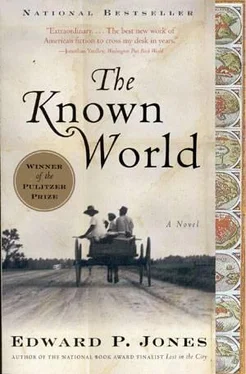About midway back to Clara’s, he decided to walk, seeing that there would be no rain and thinking the walk would ease his stomach. He sensed that Clara’s horse was not one to saunter away so he dropped the reins and the horse followed behind him, like a dog. Then the sun came out brighter, then even brighter, and he stopped and took out his Bible from the saddlebag and sat down under a dogwood tree. Before he opened the Bible, he looked all around, at the way the sun poured down over two peach trees and over the hills. The baby’s breath swayed every which way, and as he looked, he grew happier. This is what my God has given me, he thought.
He liked to think at such times that all the people in his life were as contented as he was but he knew the folly of that thought. Clara was good and Winifred and his father and even the child Minerva, growing every day beyond childhood. Maybe Barnum Kinsey the patroller had had a good night and had not awakened with a pained head from a night of drinking. A boy down the road from Skiffington had burned his leg at the fireplace and Skiffington hoped the boy was doing well. He and the boy liked to fish together; the boy knew how to be silent, which was something not easily taught to a child fisherman. He liked the boy very much but he longed for the day when he would have a child of his own.
Skiffington flipped through the pages of the Bible, wanting something to companion his mood. He came to the place in Genesis where two angels disguised as strangers are guests in Lot’s house. The men in the town came to the house, wanting Lot to send out the strangers so that they could use them as they would use women. Lot sought to protect the strangers and offered the men his virgin daughters instead. It was one of the more disturbing passages in the Bible for Skiffington and he was tempted to pass on, to find his way to Psalms and Revelation or to Matthew, but he knew that Lot and the daughters and the angels posing as strangers were all part of God’s plan. The angels blinded the men as they tried to storm Lot’s house, and then, the next morning, the angels laid waste to the town. Skiffington looked up and followed a male cardinal as it flew from left to right and settled in one of the peach trees, a red spot on shimmering green. The female, dull brown, followed, alighting on a branch just above the male’s head. Winifred had always felt such pity for Lot’s wife and what happened to her, but Skiffington had no strong opinion either way about what happened to her.
So he read through the passage, and not for the second time, and not for the third, and not for the fourth. Then he moved on to Psalms, and after four of those he thought it best to get on to Clara’s. The male cardinal was still there but the female had disappeared.
He never worked on Sunday, the Lord’s day, but riding the carriage back to town with Winifred was far from work. After breakfast, Ralph had brought the carriage around and Skiffington and Winifred and Clara came out. “I be wishin yall good mornin,” Ralph said before he disappeared behind the house. “It’s a good day for a ride. A good day for whatever it is a soul want it to be.”
”Yes,” Winifred said, “a good day for everything.”
Clara had been quiet the last evening and just as quiet that morning. Now, her arms folded across her breasts, she watched as Skiffington helped Winifred into the carriage and he came around, kissed her cheek and got in the carriage.
“I’ll take your word that everything will be fine”-and she tipped her head in the direction of the back of the house where Ralph was. They, Clara and Ralph, would live another twenty-one years together. Long before then he became a free man because the War between the States came and found them. Skiffington got into the carriage. With freedom, Ralph got it into his head that he would go elsewhere. He had people in Washington, D.C. But Clara cried and cried and said this old place, this old damn place wouldn’t be the same if Ralph wasn’t traipsing morning, noon and night all about on it. So he chose to stay; his kin in Washington had never been likable people anyway-one of them was a natural-born drunkard.
“You have my word,” Skiffington said, taking the reins from Winifred. “You got that and more.”
“John, I just don’t know what I would do if Ralph ended up murdering me. What would I do, John?” And after that twenty-one years, Clara would die first, asleep in her bed, a knife under her pillow and another beside her in the bed, as close as a lover. Her hair flowed about her head, not done up but loose, the way she sometimes liked it when she slept, the way Ralph’s hair was when it wasn’t held back by the rope.
Skiffington smiled. “I would come out and arrest him. That’s the first thing I would do.”
On that Sunday, the day Skiffington and Winifred left, Clara had been eating Ralph’s cooking for more than twenty-four years. But after that day, even though she knew no more about cooking than a bird sitting on a nest, she fixed her own meals and she sat across from him while he ate what he had prepared and looked at her and spoke about happy times as she ate what she had prepared.
“Mr. Skiffington would come out, arrest him and take him in to jail, Clara,” Winifred said. “Quicker than you could say Jack Rabbit.”
For some reason this seemed to ease Clara’s mind more than anything else he or Winifred had said that weekend. She smiled and smiled and wouldn’t let loose of the smile even as Skiffington took her cheek in his hand and tugged on it twice. The door to her bedroom was always locked. When she did not come down to fix her breakfast the day she died, Ralph went up and knocked. After more than half an hour of knocking and calling her name, he went out, his own breakfast getting cold on the kitchen table, and he walked two miles to the nearest farm, all the way into neighboring Hanover County, and brought back a white man and the white man’s one-armed cousin and the two white men forced the door open. The door had been secured each night for years with two nails.
“Clara, we’ll see you before long, surely before the end of June, unless you come into town,” Winifred said.
“Good, you know how I look forward to Mr. and Mrs. Skiffington. The Skiffingtons have a place at my table anytime.” Ralph would go to live with his people in Washington, for with Clara’s death relatives materialized from high and low and he was then without a home. The relatives sold the land to William Robbins, which angered Robert Colfax. Ralph’s people in Washington were not as bad as he had always thought. The drunkard had found God a week after a Fourth of July and had said good-bye to the bottle for good. Washington was good to the old man’s bones.
They rode home sitting close in the carriage, her arm through his and Skiffington singing a few songs his mother sang to him when he was a child in North Carolina on his cousin Counsel’s place. Then they talked for the first time about what life they wanted in Pennsylvania in a few years when he left the job as the sheriff of Manchester County. She wished to be close to relatives, particularly her sister, in Philadelphia. He wasn’t awfully partial to Philadelphia, but doing a visit up there a year before, they had come upon a nice area around Darby, just outside Philadelphia. There was even a place for him to fish, a good place to teach a son how to be patient and silent and appreciate what God had done for them.
”Will your daddy come? I wouldn’t like to think of him down here without us.”
Skiffington smiled and Winifred leaned her head on his shoulder. “The South is all he knows, but he can fish for souls up there just as easy as he can down here,” he said. His father had taken up evangelism but he was quiet about it, diplomatic, never wanting to force his religion down someone’s throat unless they gave him permission.
Читать дальше












